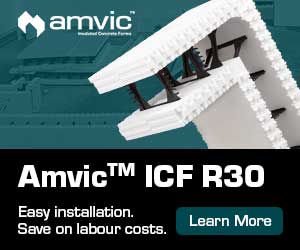
2022 Heavy Commercial
Winner
(People’s Choice Winner)
The Maine Molecular Quality Controls Inc. (MMQCI) project in Saco, Maine, is a rare example of ICFs being used in a laboratory setting. The project added and renovated a lab and office space. It was completed in June 2021 and totals nearly 50,000 square feet. The project provided a 34,200-square-foot addition for clean rooms, labs, quality control rooms, kitting, research and development, and other spaces key to the facility’s manufacturing process, as well as shell space for future fit-outs, and a 15,495-square-foot renovation of existing first-floor space.
MMQCI’s laboratories produce quality controls for monitoring all phases of molecular testing. As medical scientists discover cures and test detections for diseases, MMQCI’s control kits are needed to review testing accuracy, including those for the Covid pandemic. The project started at the onset of Covid, which necessitated smaller crews that were masked and distanced. The facility remained open during the pandemic and during its construction. The new expansion facility was built with an adjacent wall to the existing space, with two pass-throughs connecting the new facility to the old facility. Due to the work that occurs in this type of laboratory, the project team needed to pressure map each space, testing how air flowed—either negative or positive pressure—from one space to another with the opening of doors and windows. Due to the sensitive nature of the research and laboratory work being performed, particulates cannot be moving untracked from one space to another. One of the main reasons ICF was selected was its insulation properties. The form itself has 3.5 inches of insulation on each side. The insulation makes the building much more efficient for holding temperature when heating and cooling the space. Efficient building operations are also supported by the highly-efficient equipment installed in the building.
Marta Versprille, construction manager of Consigli Construction Co. Inc., estimates that the crew saved 12 days by building with ICFs. Consigli’s own self-perform crews managed the installation. ICF blocks from Amvic were used to construct the foundation, first and second levels, and roof parapet walls. The project utilized Amvic because of MMQCI’s success with ICF in its existing building, which was also constructed by Consigli. “A specific ICF challenge was the floor-to-floor exterior wall pour in coordination with beam pockets for steel and a curtainwall that spanned two stories,” says Versprille. “The team coordinated a bracing system to stiffen the exterior wall prior to placements and support the 15-foot floor-to-floor height.”
The team also managed a challenging ICF installation for floor-to-floor slab placements. The slab had to stop below the second-floor decking on the inside but run higher than the decking on the outside. The project team integrated the ICF blocks to serve as the pour stop for the slab pour into the top of the wall so that the form was continuous, rather than going out and forming up the edge of the slab. The team sequenced the floor-to-floor placement rather than splitting the process into smaller portions. “Coupled with the 15-foot height of the placements, the sequencing reduced the number of placements, and therefore saved time on the overall schedule,” says Versprille.
Clean Rooms and Snow Rooms
Due to the contaminating nature of materials used within the lab, the building required clean room walls that could be cleaned multiple times daily by MMQCI. The metal wall panels utilized, which are honeycombed in the middle and covered with a uPVC coating, were joined together and slid into a metal slot along a floor track to construct the walls that support safe operations. Because of the lab air pressures, the building must have the capability to intake a large volume of outside air, filter it and distribute it to lab spaces. This process is achieved through the building’s Energy Recovery Unit (ERU). During Maine winters, the building unintentionally sucks in snow and ice; however, when excess moisture is introduced into the ERU, it has to be shut down. To mitigate the risk of shut down in the snowy, icy winter, snow rooms were designed and constructed. The snow rooms — located directly between the exterior and ERU mechanical room — take in the winter elements through giant louvers. The snow and ice that enters the rooms through the louvers hit the baffles within the snow room walls, fall to the floor, melt, then drain to the exterior. With the snow rooms, the snow and ice are prevented from making it into the ERU, mitigating the risk of ERU system shut down due to moisture entry.
Building with VDCThis represented the first ICF project constructed with the aid of Virtual Design & Construction (VDC).
Consigli’s VDC team developed a dashboard and ICF plans to track the ICF schedule and installation. The schedule broke down installation block-by-block, detailing the exact ICF block type needed by location. With five different types of ICF block included in the foundation wall, this level of detailing mitigated uncertainty in block placement by communicating to foremen which blocks to cut for each specific location. With such detail, cutting and installation mistakes were mitigated, saving costs on repurchasing of ICF block material.
Project Statistics
Location: Saco, Maine
Type: Lab/office addition & renovation
Size: 49,695 sq. ft.
ICF Use: 21,000 sq. ft.
Cost: $17.151 million
Total Construction: 56 weeks
ICF Installation Time: 87 days
Construction Team
Owner/Developer: Maine Molecular Quality Controls Inc.
General Contractor: Consigli Construction Co.
Construction Manager: Consigli Construction Co.
ICF Installer: Consigli Construction Co.
Form Distributor: Amvic
Architect: SMRT
ICF System: Amvic
Rebar Supply: HarMac Rebar & Steel
Steel Supply: Trimax
Fast Facts
- 34,200 sq. ft. lab/facility expansion
- Approximately 4,600 man hours
- Several 36-ft. tall free-standing exterior walls
- Used 2,500 ICF blocks and 26 concrete placements
- Use of ICF saved 24 days of construction
- First ICF project built with Virtual Design & Construction (VDC)
Like what you read?
Yearly Subscriptions Starting @ $30


































0 Comments